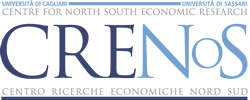Financial Development and Selection into Entrepreneurship: Evidence from Italy and US
| Title | Financial Development and Selection into Entrepreneurship: Evidence from Italy and US |
| Publication Type | Working Paper |
| Year of Publication | 2010 |
| Authors | Deidda, M |
| Number | 2010_04 |
| Keywords | business start up, entrepreneurship, financial development |
| Abstract | The existence of capital market imperfections causes business investment decisions to be strongly dependent on households' private wealth allocation. I claim that if a link exists between private wealth and business decisions, it should be stronger in countries with less developed capital markets. Here, I test this theoretical prediction assessing the relationship between initial household net wealth and the probability of switching to entrepreneurship in Italy and the United States, using household-level data from the Survey of Household Income and Wealth (SHIW) and the Panel Survey of Income Dynamics (PSID). Although Italy and the United States are both developed countries, there are striking differences between the two in terms of transaction costs, downpayment requirements and participation in financial markets. I formulated several theoretical predictions, which are then compared with the data at hand. First of all, I argue that initial wealth should matter more for potential Italian entrepreneurs, who may encounter greater difficulties than their US counterparts in obtaining sufficient funds from a bank or financial institution to start a business. From this perspective, "informal markets" (i.e. help from friends or relatives) should play a more significant role for potential entrepreneurs in Italy, especially for those who are more likely to be constrained. Secondly, I claim that a well developed financial market, by reducing household exposure to financial risk, would positively affect transition into entrepreneurship. Therefore, I fill a gap in the literature introducing a portfolio diversification index, calculated as the inverse of the Herfindhal index, in order to assess the level of financial sophistication. Last but not least, I simultaneously estimate the probability of switching to entrepreneurship and changes in net wealth. Using a sample selection model with endogenous switching makes it possible to deal with endogeneity issues, related to the fact that households may actually accumulate assets prior to setting up a business. |
| Citation Key | 2664 |
| Attachment | Size |
|---|---|
| 766.68 KB |
